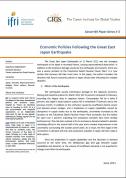Rare Earths and the East China Sea: Why hasn't China embargoed shipments to Japan?

As tensions persist between China and Japan in the East China Sea, it is interesting to note that one of the most symbolic actions of the previous crisis has yet to make an appearance this time around.
The stoppage of rare earth shipments to Japan in the fall of 2010 lasted nearly two months, threatened the health of vital Japanese industries, and placed this once obscure raw materials issue on the front page of newspapers across the globe. China’s near monopoly on the global production of rare earth oxides - metals that have become essential components in making a range of high tech products that include vehicles, wind turbines, consumer electronics, medical equipment and defense systems - proved to be a useful tool for applying pressure on Japan. Two years later, the possibility of China cutting off Japan’s access to rare earths has been floated once again in the Chinese press, but has yet to take place. So why hasn’t China played the rare earth card?
The opacity of China’s decision-making apparatus and of the rare earth business itself makes precise answers hard to come by, but a number of related points are worth noting and ultimately serve to contextualize China’s real power to use rare earths as an economic weapon today. In particular, the risks for China seem to be higher today than in 2010 while the potential impact on Japan is much lower.

Available in:
Regions and themes
Share
Download the full analysis
This page contains only a summary of our work. If you would like to have access to all the information from our research on the subject, you can download the full version in PDF format.
Rare Earths and the East China Sea: Why hasn't China embargoed shipments to Japan?
Related centers and programs
Discover our other research centers and programsFind out more
Discover all our analysesThe U.S. Policy Toward Taiwan Beyond Donald Trump: Mapping the American Stakeholders of U.S.-Taiwan Relations
Donald Trump’s return to the White House reintroduced acute uncertainty into the security commitment of the United States (U.S.) to Taiwan. Unlike President Joe Biden, who repeatedly stated the determination to defend Taiwan, President Trump refrains from commenting on the hypothetical U.S. response in the context of a cross-Strait crisis.

China’s Strategy Toward Pacific Island countries: Countering Taiwan and Western Influence
Over the past decade, China has deployed a diplomatic strategy toward the Pacific Island Countries (PICs). This strategy pursues two main objectives: countering Taiwan's diplomatic influence in the region and countering the influence of liberal democracies in what Beijing refers to as the "Global South."

Opening up the G7 to South Korea to Address Contemporary Global Challenges
The G7’s global influence has diminished as powers like China reshape international governance through initiatives such as BRICS and the Shanghai Cooperation Organisation (SCO). With the G7 now representing just 10 per cent of the world’s population and 28 per cent of global GDP, its relevance is increasingly questioned.
Expanding SPDMM as a pivotal institution in the Pacific – A French perspective
The South Pacific Defence Ministers’ Meeting (SPDMM) is the only forum that brings together defense ministers from the wider South Pacific — including Chile, which is hosting it for the first time. This heterogeneous group of countries with varying resources, capacities, and interests — Australia, Chile, Fiji, France, New Zealand, Papua New Guinea (PNG), and Tonga — are united by their shared determination to strengthen cooperation on maritime security and humanitarian assistance and disaster relief (HADR) activities.









